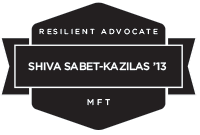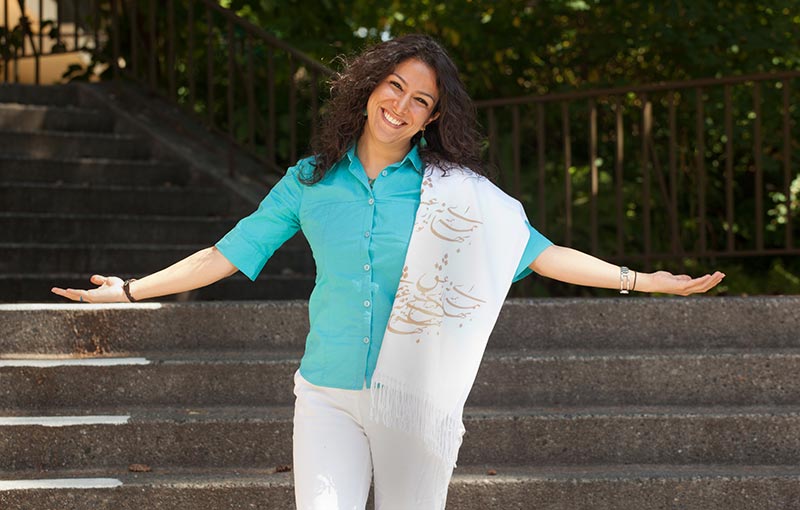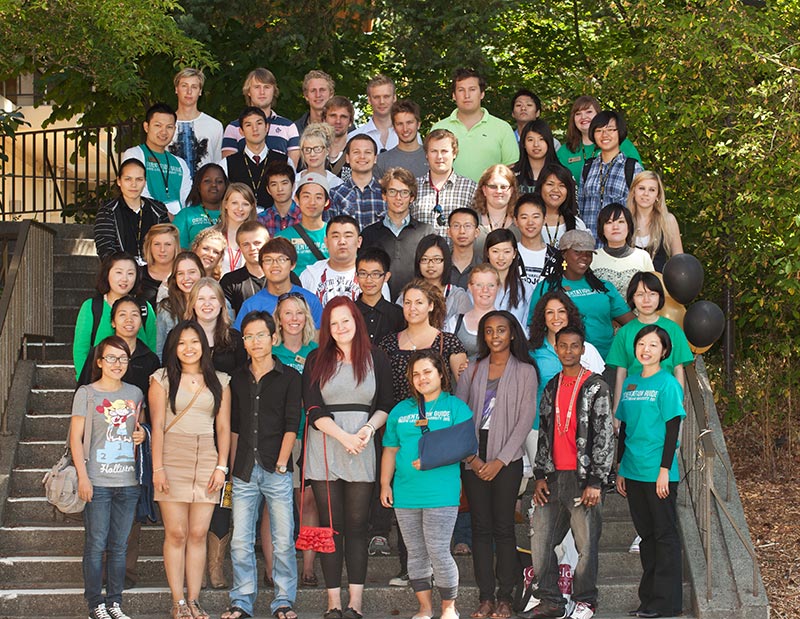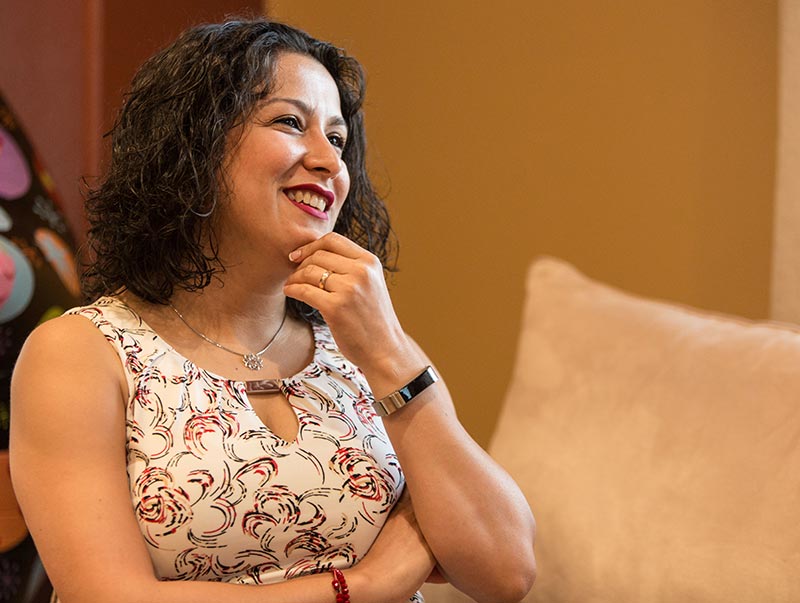
Shiva Sabet-Kazilas ’13 couldn’t just resign from her job in Iran. Her supervisor wouldn’t allow it until her visa was in hand and she was prepared, with certainty, to leave for Pacific Lutheran University.
“For over 30 years, religious oppression and harassment have been a part of my family’s life,” she said.
Sabet-Kazilas, a member of Baha’i faith, faced marginalization in her home country dating back to kindergarten. Baha’i followers there experience pervasive persecution at the hands of their own government. They are denied employment and access to education, and they endure ransacking of their homes and wrongful imprisonment, among other institutional abuses.
Only after she was cleared to leave for the U.S. in 2011 did Sabet-Kazilas learn that the government had threatened her employer several times, urging the company to fire her and two other Baha’i employees.
“There are few companies who rebel against the government and allow Baha’is to work,” she said. “He wanted me to have my feet on solid ground.”
Sabet-Kazilas, now a graduate of PLU’s Marriage and Family Therapy program, found solid ground and is building on it.
She has a baby with her husband, Ignas Sabet-Kazilas ’14, and is working to start a private practice. She wants to serve refugees and immigrants, as they navigate the trauma of their own marginalization in the U.S.
“There is so much that I can resonate with, the oppression they have gone through,” she said. “I understand a lot of things they have experienced.”
Sabet-Kazilas says gaining graduate-level admission to PLU represented years of hard work and resilience. She graduated in 2008 with a degree in psychology from the Baha’i Institute for Higher Education, which was founded in 1987 in response to the Iranian government’s campaign to block Baha’i followers from pursuing higher education. She earned a bachelor’s degree despite a lifetime of intimidation in Iranian primary schools.
“With my parents’ perseverance, I was able to get into the elementary school,” she said. “However, religious harassment and oppression remained a part of my school years. Me and my other Baha’i friends were asked to renounce our faith and claim that we are Muslim. When we refused that, their harassment got worse and eventually we all got expelled from school. Some of my friends had to move to another city in order to get enrolled in schools.”
Even after all she had overcome, though, getting into PLU’s graduate program wasn’t the end.
“In that moment I was filled with fear,” she recalled. “Now what?”
REALITY HITS HARD
Sabet-Kazilas was in disbelief as she contemplated what came after the acceptance letter and “generous scholarship offer,” she said.
“I could not believe that a new chapter of my life was beginning,” she said. “I was at once proud of what I have achieved and hesitant of the unknown.”
Still, Sabet-Kazilas embraced her decision to become a Lute. She traveled to the U.S. embassy in Dubai to apply for a visa, just a few short months before she was due on campus in August.
When July came and the visa didn’t, Sabet-Kazilas doubted her dream of becoming a therapist would be realized.
But her supporters at PLU — who were wowed from the moment they interviewed Sabet-Kazilas half a world away — couldn’t let her newest journey end before it started: “Don’t lose hope,” they told her. “You’ve come a long way.”
“They didn’t give up on me, and I was so happy that I found a place that has faith in someone out of the country.”
“They were so kind,” Sabet-Kazilas said. “They didn’t give up on me, and I was so happy that I found a place that has faith in someone out of the country.”
PLU graduate admission staff emailed the embassy on her behalf and uncovered the long-lost visa, just 10 days before orientation began.

“It was a marathon at that point,” Sabet-Kazilas said, laughing.
Rapid packing.
Buying a replacement airline ticket for the one she canceled.
Compiling a list of essentials.
Gathering essentials at stores unfamiliar to her upon her arrival.
Setting up bank and cellphone accounts.
After it was all said and done, Sabet-Kazilas sat in an empty Red Square, quietly reflecting on the journey. “The reality hit me hard,” she said.
FAMILIAR VALUES
Sabet-Kazilas’ desire to come to the U.S. grew out of her desire to serve other marginalized Iranians. She worked with underprivileged populations back home, teaching life skills and empowering young people. She also taught English classes privately out of her home.
“I had a strong desire to serve my country and people,” she said. “Through our educational work, I learned that I needed to know more about family dynamics in order to be more effective serving this population. … I came to a conclusion that marriage and family therapy could provide me with skills and expertise needed.”
After two years of research, Sabet-Kazilas applied to roughly 20 programs in the U.S. Only a handful of them — PLU included — accepted her BIHE degree. PLU was her top choice. It had everything: national accreditation, an on-site clinic, rigorous academics, an inclusive environment.
And its values spoke to her, as well as her faith.
A core tenet of Baha’i faith is oneness of humanity, a concept that transcends racial and class divides. The religion disavows prejudice and systemic exploitation — such as racism, sexism and classism — stressing that they are contrary to the unifying vision.
“Anywhere there is a human being and a heart you can worship as Baha’i,” she said. “Together we engage in a process of creating change from grassroots.”
So, PLU felt familiar: “Its mission statement resonates with my heart.”
Sabet-Kazilas added that the stigma associated with welcoming an Iranian student is often difficult for institutions to move past. At PLU, it was different. “They truly treated me like anyone else,” she said.

RICH WITH DIFFERENCE
David Ward, director of the university’s Marriage and Family Therapy program, says the MFT cohorts are more valuable when they welcome students such as Sabet-Kazilas.
“We get to work with all those differences in the classroom,” Ward said. “And that’s great because those are the exact same differences you get to work with as a therapist.”
Ward says the field of marriage and family therapy focuses on relationships and contexts as core factors in mental health treatment and relational functioning. “We can only understand ourselves through our interactions with others,” he said.
The key is treating the whole person, where they are at, taking into consideration race, gender identity, religion, socioeconomic status, and all other contexts that shape a person.
“Where we find ourselves in relation to our world really matters,” Ward said. “We want to really recognize that a person’s place in the world influences them.”
To remain authentic in that pursuit, Ward says it’s imperative that MFT students engage that approach themselves as they learn. In addition to welcoming undergraduates from a variety of disciplines, Ward says they work hard to find students with diverse life experiences. It’s a big reason Sabet-Kazilas stood out, he noted.
“In our program, you’re going to be challenged to work with people who aren’t like you, and we really value that,” Ward said, adding that it mirrors the work they’ll do later as therapists. “You don’t get to pick and choose who you work with when they walk into the room, and you have to be able to value where they’re at. That is a key aspect of our program.”
And MFT students apply those skills as they acquire them, treating community members through The Couple and Family Center, PLU’s on-site clinic. It offers affordable, high-quality care to individuals, couples and families seeking therapy solutions for family, parenting, depression, anxiety, divorce, trauma and more.
Graduates of the Marriage and Family Therapy program at PLU tout a 100 percent pass rate on the national licensure exam.
“Studying while practicing really made that experience rich,” Sabet-Kazilas said of the program’s clinical component.
Clinic services are priced on a sliding scale, which helps serve uninsured people and those who need services not covered by insurance. Students provide about 10,000 hours of direct client care annually both at the clinic and through internships in surrounding communities, Ward said.
“Community mental health would come to a halt if programs like ours didn’t exist,” he said.
Just as the therapists in training are sitting with their clients in difficult moments in the clinic and internships across Pierce County, they also are sitting with their own vulnerabilities in the classroom.
Ward said the cohort model in the MFT program allows students to build trust with their peers in a small group of about 20.
“The types of conversations you can have with people you’ll be with for two years are different than the ones you’ll have with people you’re going to be with for 15 weeks,” he said, stressing the sense of support and authenticity that results from those classroom discussions. “These are relationships that start in the program and last for a very long time.”
A THERAPIST’S CONTEXT
Ward says the context surrounding Sabet-Kazilas isn’t just a benefit to the cohort she graduated with; it’s a benefit to her future clients.
“There’s an empathy and an understanding that clients will experience from Shiva that they won’t experience from others who haven’t lived through that experience,” he said. “Her experience allows her to connect with pain, connect with suffering, connect with courage, connect with resiliency. It allows her to connect and have that credibility in the room that someone like me would not have, because I haven’t lived it.”
Sabet-Kazilas acknowledges that her trauma resonates with the growing needs of refugees and immigrants in her newfound home. But she’s also quick to acknowledge her “safety network” — the collective strength that came with experiencing trauma alongside others.
“The sense was always that we were not the victim. We were dealing with an oppressive government, but I never felt that I was inferior,” she said. “Going through this with a community made it different. I know how important it is to have a community to go through this with you, and I want to help (my clients) build that community for themselves.”
And Sabet-Kazilas doesn’t take for granted how fortunate she is to be in a position to use her education in service to others — just as her faith calls her to do.
Upon arriving at PLU, she says she photographed everything, from lectures to extracurriculars. A photographer’s daughter, Sabet-Kazilas knew how important it was to capture her history as it unfolded.
“I felt like I was the eyes of my relatives and friends who were deprived of this opportunity,” she said. “I wanted them to experience every second of what I was experiencing. That was a historic moment in my life and I needed to have a visual memory of what happened.”



